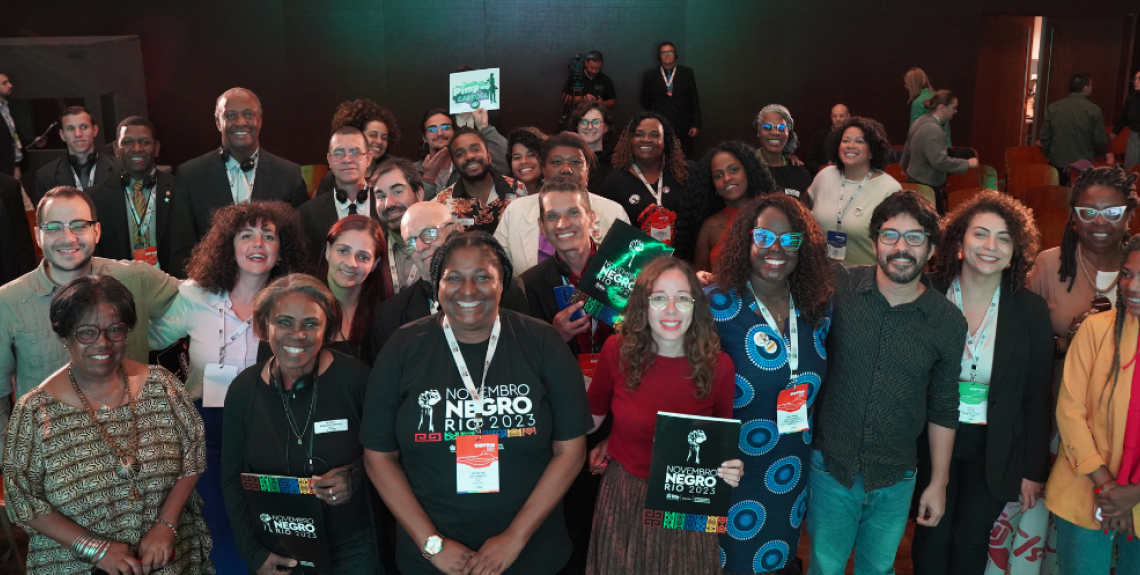On 7 November 2023, in the framework of the 22nd Conference of the International Observatory on Participatory Democracy (IOPD), the Coordination for the Promotion of Racial Equality (CPIR) of Rio de Janeiro organised the session "What makes a city antiracist? Proposing an agenda for local action." In this meeting, Anabel Rodríguez (Barcelona), Jackeline Nascimento (Rio de Janeiro) and Oilda Rejane (Salvador) shared their municipal experiences in terms of redressing historical injustices, fighting systemic racism and understanding micro-racism through local public policies. Douglas Leite, PhD in Social History from the Fluminense Federal University, shared his work on the municipal anti-racist index promoted in the framework of the Network of Antiracist Cities launched by the Rio de Janeiro City Council.
How to build anti-racist cities?
-
Adopting a cross-cutting approach through interdepartmental coordination and structural dialogue with civil society
In Salvador (Brazil), the Municipal Secretariat for Racial Reparation, led by Oilda Rejane, is in charge of organising training for civil servants on diversity and the fight against discrimination. This training, coordinated across all departments, is part of a municipal action plan regulated by the Statute of Racial Equality, which allows each municipal department to include an anti-racist perspective in its work. A technical committee implements this plan, ensuring evaluation and monitoring through quarterly reports. "It is impossible to fight racism from the outside if we do not work internally in a city where 82% of the population is black.
-
Implement structures, strategies, mechanisms and services to bring about cultural change at the local level, to make racial oppression explicit and act against it
"According to our latest data from 2022, racism is one of the main discriminations that prevent access to rights, and this trend has been confirmed in recent years," says Anabel Rodríguez Basanta, Director of the Directorate of Citizens' Rights Services in Barcelona. For this reason, and in order to combat structural racism, the Municipal Office for non-discrimination has a series of strategies, structures, services and mechanisms aimed at making racism and its impact visible, combating it, transforming local culture and supporting victims. This system is reinforced by the participation of civil society, which co-constructs the instruments that enable the implementation of an effective local anti-racist public policy. The municipality has launched several campaigns against hate and prejudice, defends the right to financial inclusion so that people who suffer discrimination can open a bank account, and organises a service of attention and complaints for people who suffer racism. It also promotes training and dialogue in its housing, social support and public space services, as well as with nightlife professionals (bars, nightclubs, etc.) and local associations.
Learn more about the work of Barcelona's Directorate of Citizenship Rights Services and the Action Plan for an Antiracist Barcelona
-
Organise advocacy activities at national and international level
This is what the Network of Antiracist Cities, launched by the city of Rio de Janeiro, proposes: "an opportunity for the fight against racism, in particular with the development of local public policies to tackle this systemic and everyday problem," in the words of Jackeline Nascimento, from the Coordinating Committee for Racial Equality of Rio de Janeiro (CPIR). This initiative is the result of the Pact to Combat Racism and Promote Ethnic and Racial Equality, proposed by the CPIR secretariat and signed on 20 June 2022 by 21 Brazilian cities.
-
Promote an international working space for advocacy and implementation of public policies at the local level
This is the work of our Committee within UCLG to formalise the relationship between public policies, social movements and citizen participation, motifs of the IOPD Conference and which our coordinator Amanda Flèty Martinez put at the forefront in the path of building anti-racist cities. "It is the responsibility of local governments to make visible and challenge structural and institutional racism. It is time to incorporate an anti-racist perspective within the municipal movement.”
-
Involve other social sectors, such as academia, to develop common indicators to measure racism.
Douglas Leite, PhD in Social History, shared about the work of the Federal Fluminense University to develop an index to measure anti-racist public policies in Brazil. This initiative arose from a local experience that has grown into a network in the city of Niterói. These indicators also represent a participatory tool for citizens, since through them they can monitor the political responsibilities of public officials.


